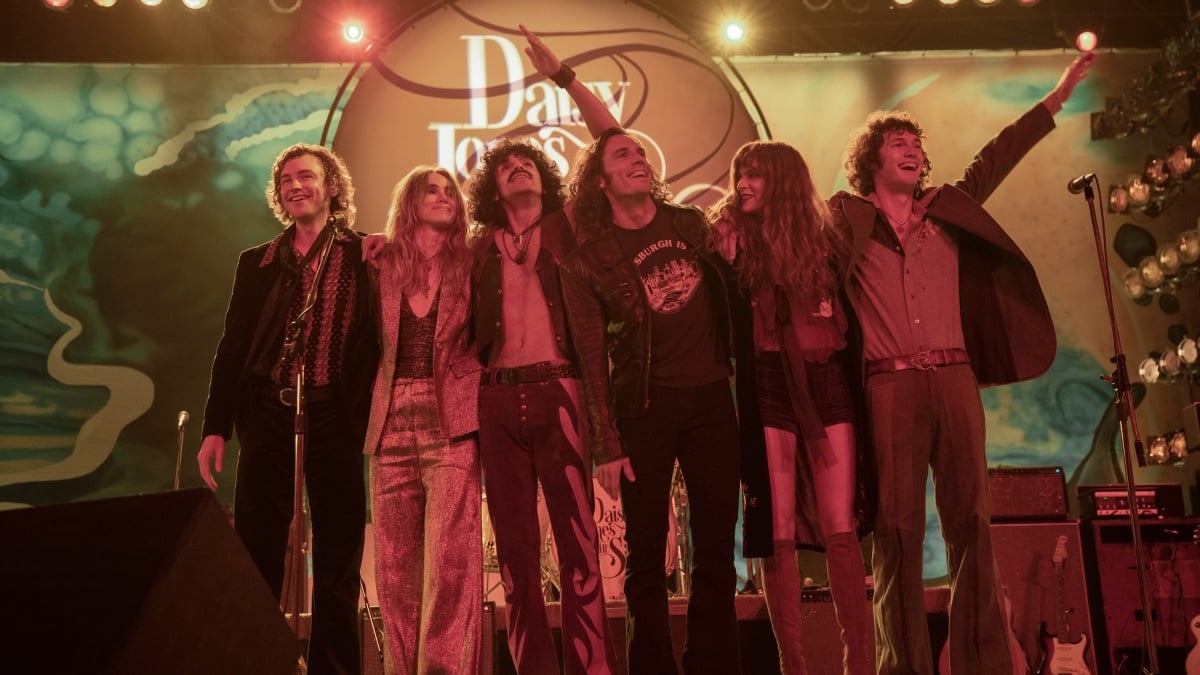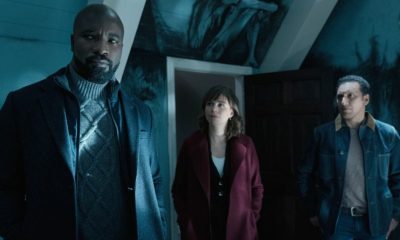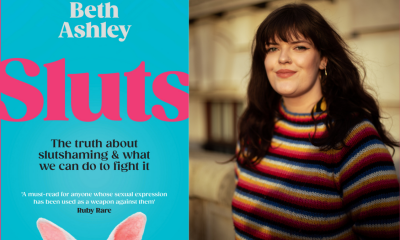Entertainment
‘Daisy Jones and the Six’ review: Can this fictional band be your next musical obsession?

Daisy Jones and the Six catapults us back into the ’70s for a look at the meteoric rise and tumultuous fall of the eponymous band, from humble beginnings to sold-out concerts, studio sessions to drug-filled afterparties. Though the show definitely takes liberties from Taylor Jenkins Reid’s greatestselling novel, it remains an engrossing portrait of a rock band battling personal demons and relationship drama.
Sure, the story of a music group breaking up is one we’ve seen before, but thanks to some great music and solid leading performances from Riley Keough and Sam Claflin, Daisy Jones and the Six becomes a rock and roll rollercoaster you’ll want to see to the end.
How does Daisy Jones and the Six compare to the book?
Just like the novel on which it is based, Daisy Jones and the Six takes the form of an oral history of the band, 20 years after they split. Episode 1 opens with members of Daisy Jones and the Six — all in aged makeup of varying levels of success — sitting down to be interviewed.
There’s frontwoman Daisy (Keough) herself, guitarist Graham Dunne (Will Harrison), bassist Eddie Loving (Josh Whitehouse), keyboardist Karen Sirko (Suki Waterhouse), and drummer Warren Rhodes (Sebastian Chacon). Most reluctant of all is lead singer-songwriter Billy Dunne (Claflin), who appears shocked that Daisy even agreed to this.

Riley Keough as Daisy Jones.
Credit: Lacey Terrell/Prime Video
As the band members tell their story — complete with testimony from Billy’s wife Camila (Camila Morrone), disco legend Simone Jackson (Nabiyah Be), and manager Rod Reyes (Timothy Olyphant) — we flash back to the origin story of what would soon become Daisy Jones and the Six. All the way at the beginning, Daisy is a songwriter and music lover trying to find her voice, while the others are a part of rock band The Dunne Brothers, later named The Six. By themselves, Daisy and The Six are both good, but not great. Put them together, and you get magic.
This being an adaptation, Daisy Jones and the Six does make some changes from its source material. Some of these, including the order of certain events leading up to the band’s creation, are more surface-level. Others are much larger, like cutting band member Pete entirely, or giving Simone a bigger storyline of her own. The latter is a nice expansion on Reid’s novel, allowing us to explore more of the disco scene that is so important to Simone.
The framing device of the interviews also functions a little differently here. In the novel, different characters’ accounts would often contradict each other, leaving the truth somewhat ambiguous. The show presents a more definitive account, as well as a somewhat lighter, more sanitized version of the sleazier aspects of band life. (For a more in-depth rundown of the differences between the novel and the series, check out Mashable’s breakdown of the biggest changes, which will be updated weekly.)
Daisy Jones and the Six is mostly the Daisy and Billy show — and that’s not a bad thing.

Riley Keough and Sam Claflin as Daisy Jones and Billy Dunne.
Credit: Lacey Terrell/Prime Video
The first episodes of Daisy Jones and the Six are enjoyable, but also the show’s most perfunctory, moving pieces into place for the moment when Daisy and Billy finally cross paths. However, once those two meet in a contentious recording session, we’re off to the races.
At first, Daisy and Billy are hesitant to collaborate. Their egos clash, and Billy’s initial dismissal of Daisy only fuels her anger. But as they start working together on what will soon become Daisy Jones and the Six’s album Aurora, they find common ground — and perhaps something more.
Daisy Jones and the Six‘s trailer highlights the love triangle between Billy, Daisy, and Camila, but the show’s actual handling of those relationships is more nuanced than the promo suggests. Daisy and Billy’s feelings walk the line between real love, a show for their fans, or even manipulation to get the greatest out of each other for their music. Then there’s Camila, who warmly welcomes Daisy into the Six yet struggles to trust Billy around her. Threading through it all is the looming threat of Daisy’s drug use — something that is all too familiar to Billy and that may pose a risk to his sobriety.
The Daisy-Billy dynamic remains the juiciest part of the show, with the potential for mess only strengthened by the framing interviews. (“It was obvious that they made each other better,” Karen says before delivering a line straight out of a true crime documentary: “Until, of course, they didn’t.”)
However, Keough and Claflin’s performances (and excellent chemistry) help Daisy Jones and the Six steer out of total soap opera territory. Both are intensely charismatic yet vulnerable, grounding their rock star drama in their characters’ very real anxieties concerning love, fame, and family.
All these heavy emotions comes to a head in the show’s phenomenal music, with soundtrack choices including Patti Smith and Fleetwood Mac — whose real-life drama and classic album Rumours inspired Reid — and a whole host of memorable original songs. Aurora is now a full-fledged album, featuring bangers like “Regret Me” and “Look At Us Now (Honeycomb)” courtesy of lead producer Blake Mills and the help of other musicians like Phoebe Bridgers, Jackson Browne, and Marcus Mumford. Keough, Claflin, and the rest of the band perform the hell out of these songs; they’ve not only been stuck in my head since watching the series, but they’ve also launched me right into a Fleetwood Mac phase, which may be the highest compliment I can give them.
Daisy Jones and the Six certainly isn’t perfect. It can fall into clichés in its handling of drug use and romantic tensions within the band, and its main focus on Daisy and Billy does force other band members into the background. Overall, though, it’s a wildly fun watch that will keep you hooked until you find out just how the band fell apart. Daisy and Billy may regret each other, but I certainly don’t regret spending 10 episodes with them.
-

 Entertainment7 days ago
Entertainment7 days agoApple Watch Series 9 vs. SE: A smartwatch skeptic tested both for 13 days
-

 Business5 days ago
Business5 days agoGoogle lays off workers, Tesla cans its Supercharger team and UnitedHealthcare reveals security lapses
-

 Entertainment6 days ago
Entertainment6 days agoThe greatest films on Prime Video right now
-

 Business7 days ago
Business7 days agoGoogle dubs Epic’s demands from its antitrust win ‘unnecessary’ and ‘far beyond the scope’ of the verdict
-

 Entertainment2 days ago
Entertainment2 days agoiPad Pro 2024 now has OLED: 5 reasons this is a big deal
-

 Entertainment6 days ago
Entertainment6 days agoLoneliness in kids: Screen time may play a role
-

 Business7 days ago
Business7 days agoApple: pay attention to emerging markets, not falling China sales
-

 Business4 days ago
Business4 days agoThe Rabbit r1 shipped half-baked, but that’s kind of the point



























